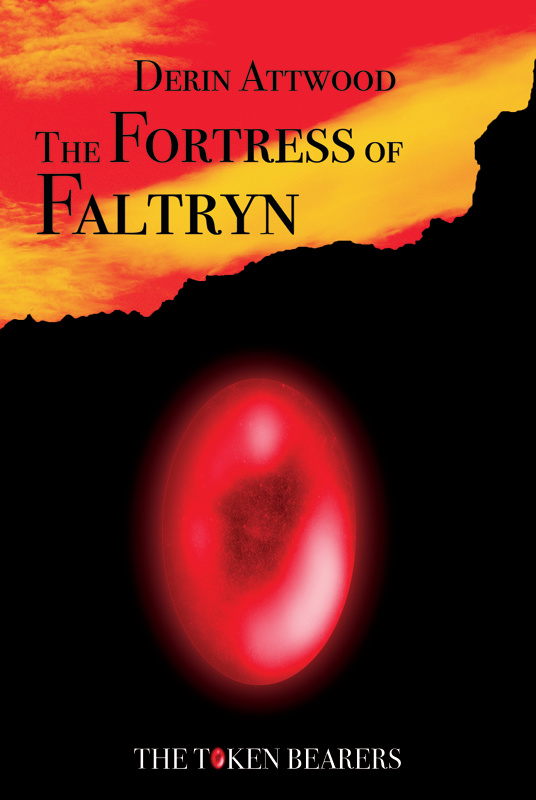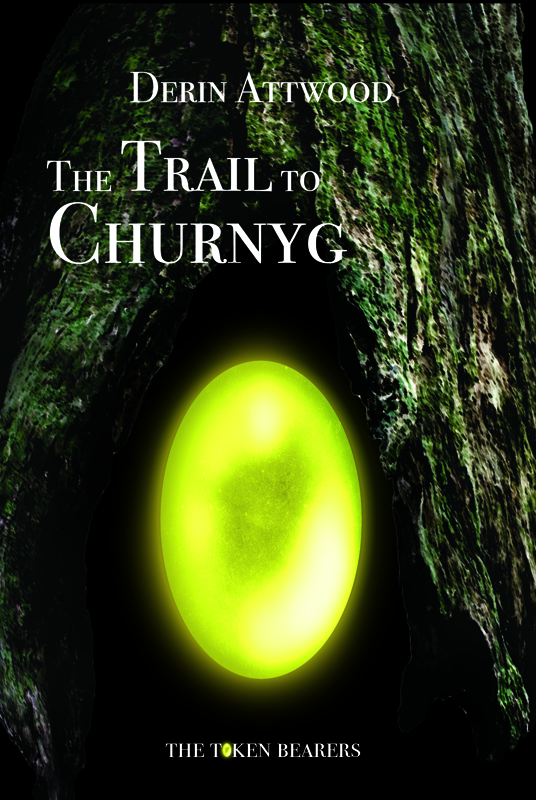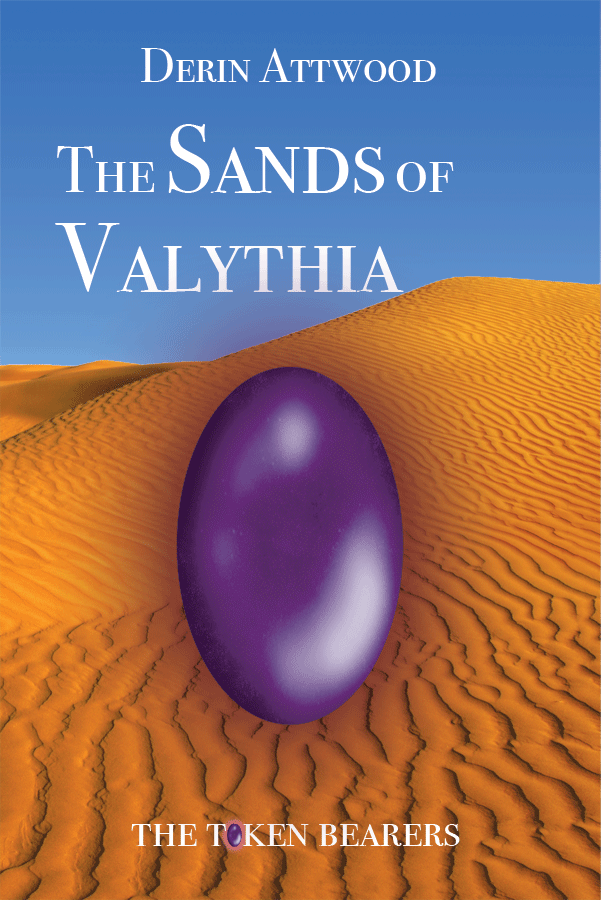Lee Murray's NZ Speculative Fiction Show - Derin Attwood
- Lee Murray

- Aug 7, 2018
- 11 min read
Welcome to Lee Murray’s New Zealand Speculative Fiction Show, an interview series featuring star acts from NZ’s science fiction, fantasy and horror community, including news, insights, and sneak-peeks of their latest performances.
Today’s guest is Northland fantasy writer Derin Attwood, author of The Token Bearers, an epic eight-volume series for YA readers. Welcome Derin!

Thank you so much for inviting me, Lee.
Six books! That’s incredible. When you started writing the series, did you ever think you would take it this far? What challenges do you face in keeping a readership engaged over so many titles? Is the symbolism of the tokens vital to this?
The sixth book, The Portal to Halavash, will be released later this year, but the plan is for another two following, unless my characters decide to drag me along for further adventures with them.
I began writing the story in 2006. I didn’t imagine even a book, let alone a series. While motor homing with my husband, and on a freezing day, I finished reading a book, and it was too cold to go and find another. My laptop was close enough to use without disturbing the cocoon I had wrapped around me, so I thought I would write a short story. It grew and grew, and really, I have never stopped writing it.
I write for me, and I’m amazed and delighted that others have enjoyed reading it. I have a beta reader who questions everything. If I can’t assure her there is a scientific explanation behind the things happening, she demands I rewrite. I’m fortunate that I’ve been researching since I was quite young, so many of the concepts just need a refresh. She doesn’t question the dragons, but I guess everyone knows and accepts dragons.
I’ve never thought about engaging with the readers, but it happens naturally. Some keep in touch, emails or letters, and they seem to love what is happening in Kirym’s life. As the stories continue, it is harder to find new and different adventures, especially as I have no concrete idea of where the characters are going, nor what they will meet. They do tell me eventually.
The tokens, as with the story, arrived and grew. I was as amazed as Kirym when we together discovered something new.
There are hundreds of characters in your stories, but Kirym is integral to them all. Who did you model your character on? Does she share any characteristics with you?
Kirym just arrived, and once I found a name for her, her strength grew. One early reader told me he thinks Kirym is the person I’d like to be, my alter ego. Perhaps he is right.
I didn’t purposefully model her on anyone in particular, but her love of family and friends does come from me. So, does her love of reading and discovering new things.
One of the things I noted when I started reading the series was the way you have filled the stories with complex and engaging female characters with agency, and including older women. Did you intend to make a feminist comment through your writing, or was it just a case of populating your stories with interesting characters?
I have always admired strong women. From an early age, I realized most older women have a huge store of knowledge to tap into. Many have an innate common sense. They are quirky, interesting, and have wonderfully exciting stories to tell, once I got them talking.
I wanted women like that in my stories. As much as I love the heroes and heroines of any book, it is often the lesser characters that stay with me when I put a book down. I wanted those sorts of characters around Kirym.
If you were to set out on an epic journey of your own, what favourite books would you hope were in your knapsack and why?
I would need a huge knapsack. In it I would have some of my favourite series in it, Diana Gabaldon, David Baldacci, John Grisham, J K Rowling, and Patrick Rothfuss. I would have books written by authors I know, and that would include some of your books, Lee, which I’ve loved reading. I’d also take recommendations from friends. I try to read three or four of these new and unknown (to me) authors each year. They are always interesting, and often exciting, leaving me with a new author to add to my considerable list of favourites. I’d also add a few history books, a few old classics, and some on forensics, (my latest interest for a future book).
Come to think of it, journeys occur in almost all your stories. Are you a bit of a world traveller yourself? Tell us a little bit about your ideal journey / destination.
For me, my ideal location would be somewhere I have family and / or friends. My favourite journeys include them. Until five years ago, I had never left New Zealand, and my only journeys have been to family in Australia. Most of my travelling has been done from an armchair. However, I have always read widely and followed whatever adventure I was on with atlases and roadmaps. The internet has made it easier, now I can go to actual locations and explore.
I did spend three years travelling around New Zealand with Ron, soon after we married. It was a fantastic adventure, and that’s where Kirym’s adventure began.
A lot of research goes into your stories ‒ with new technologies and concepts often introduced within your world building. Any interesting snippet from your research that you’d care to share with us?
Once I study a new concept, I then need to sit and think about how I can incorporate the knowledge I have gained into a cohesive scene. It’s not always easy. Occasionally I’ve realised I can’t master a particular art (even mentally) to an extent where I could write a believable scene. I will not cut a scene simply because I can’t do it. I figure out a way around it.

In The Burl of Meglinor (book five), Kirym was caught up in a battle. I studied many battles and finally came to the conclusion that in this case, I couldn’t write it believably. Nevertheless, the battle was raging and Kirym was caught up in the middle of it. I finally had her attend to the first victim of the battle, tending his wounds as he gave her information only he knew, and she desperately needed. The battle flowed around them, mentioned as it affected them. It was one of the most difficult scenes I have written, because I had little knowledge. In the end, I think it is believable.
What is fush grass?
Simply, a spelling mistake.
It explains my way of finding new exciting things for the planet Kirym lives on. When I needed a special type of grass, I wrote (I thought) **rush family, wider, longer, various attributes**. The double asterisks told me to research and expand concept.
When I returned to it, I found ‘fush family’. It seemed to work, so I kept it. But my spelling is appalling, being dyslexic doesn’t help.
In your view, what elements are essential to a good fantasy?
All fantasies need a good believable base. The protagonist must have an attainable goal while the antagonist must have a believable reason to do what they do. All characters are flawed, they need to be, because no one is perfect. In the case of The Token Bearers, Kirym’s family relationships had to work well together. There was the usual sibling bickering as seen in any family.
The world of The Token Bearers maintains a tribal culture of sorts. Is this a nod to your Kiwi background?
I think it’s more of an acknowledgement of my desire to be part of a huge loving family, who live close, who frequently visit and eat together.
Do you have a favourite book in The Token Bearers series? One which particularly resonates for you on a personal level?
That’s a bit like asking, who is my favourite child, although on that subject, my son, Garreth, insists it’s Kirym. Hers is the name that most comes to mind when I am speaking to him. I hang my head in shame, but as my son says, “the facts speak for themselves.”

Each of the books has special people and wonderful adventures. I have a soft spot for The Caves of Kirym, where it all began, but I smile most when I think of book four, The Sands of Valythia. Kirym forges a special bond with my favourite dragon Ubree, and he discovers his strengths in the desert of Valythia. I retrospectively realised that Ubree was based on a very special person, although that person has no idea. Having said that, I love book two where Kirym meets Wind Runner and begins to extend her family.
You have an open fire to cook on and a full moon to cook it under. What are you preparing for dinner?
A big pot with a hearty stew bubbles away, meat and lots of vegetables. I’d also have bread baking in the embers, and marshmallows sitting aside to melt as the fire burns down.
Desert would be fruits, chopped up in honey, with a sprinkling of nuts. In a large pot on the side, I would have a lovely mulled wine. A feast Kirym would enjoy.
Sitting nearby would be a storyteller and a couple of musicians. There would be a mountain of rugs and cushions, so everyone would be warm as the night air cooled.
How important has it been to you to maintain the consistency of the cover design across the series?
I think that has been vital. I take my hat off to Llyvonne Barber of Wordly Press, who gifted me the design, having created it from the concept idea I gave her. The challenge has always been to align them to the storyline and she always rises to the occasion. She also formats my manuscripts, sends them to the printer, and generally manages all the things I have no desire to learn.
Can you tell us about the Emory project?
Some years ago, I started Pen-Ultimate, a small writing group. We meet fortnightly to critique each other’s work and discuss the art of writing and publishing.
In 2015, I suggested they write a book together to see the process of getting a book through writing, editing, to print, and release. I suggested they set it in New Zealand in the mid 1980’s, invented a street, Oak Tree Lane, and a pile of crazy people. The result was Emory.
The project was designed to expand their knowledge of the publishing world, and because I was tied up with my series, I decided not to take part. However, for various reasons, I eventually contributed three of the stories, and in doing so, realised I could write to order, something I had never done before. It was a great experience, because I really thought I could only write fantasy, where dragons could fly in and save the day. This time, I had to research the 80’s, because although I lived during the time, I discovered I had forgotten a lot of the details. Overall, it was an extremely good experience for me, and the other writers are justifiably proud of their work.

What does a typical writing day look like? What about good writing day?
Ideally, I write from 9.00 until 12.00, have an hour for lunch followed by an hour of research. I then write from 2.00 until 5.00, when I shut my computer and read until 6.00. After tea, I will write for another hour if I am on a roll, and then spend an hour on Facebook and catching up with my family and friends. After that, I will knit (I make shawls), read, and talk to Ron, who will ignore me because he is reading.
Typically, there is more deleting, more research (often about things that have nothing to do with my writing, but someday might) more Facebook, and more reading and knitting.
In my home, everyone reads from 5.00 until 6.00. There are no exceptions. I generally read a novel of some sort, nothing to do with my work or writing. I look on it as a vital part of my writing day.
What are you working on right now? Any chance of a sneak preview?
I’m waiting for the cover art for book six, The Portal to Halavash. Then it will be formatted, checked and go to the printer. Again, I have gone into new territory with this book.
Preview:
Kirym Speaks.
The tentacle tightened its hold on me and began to move towards the massive trunk. Its speed amazed me, and I wondered if it was attempting to crush me against the tree. Instinctively, I swung the sword to the front for whatever protection it could give me.
It jolted into Danth, piercing his eye. Black slime oozed out, he groaned as the gelatinous liquid ate into his face. His nose and cheek began to dissolve, his trunk writhed in agony and the groaning got louder. He ripped the dissolving bark off his cheek and the sections of his body below it and hurled them over the trees and into the desert beyond. He dug at his eye, pulling half of it away from his face and dropping it to the ground where it scrabbled through the dust towards the tree roots.
All the while, the scream continued.
A patch of white flashed past me; Faltryn, half flying, half climbing, zigzagged her way up the trunk, deftly avoiding the few tentacles trying to brush her off. When she reached the gash where a branch had earlier been torn away, she coughed a small spurt of fire into it. A few sparks spilled from the hole, Faltryn took another breath, but before she could try again, a tentacle brushed her off the trunk.
She fell.
Branches and tentacles whipped around trying to grab her, but all missed. One branch was more accurate, but as it was about to hit her, she extended her wings, swooped around it, over a tentacle, under another, and disappeared into the dust rising from the ground.
More sparks shot from the hole Faltryn had breathed in and smoke began to billow out. The fire caught and roared towards the sky.
Danth’s screech was inhuman. Tentacles whipped around in a frenzy, and although none touched me, they tried to rip the tentacle holding me away. I suspected Ubree was protecting it and me, it seemed the only reason I wasn’t lying broken in the desert.
Slowly, Danth began to crumble from around the sword, his face, what was left of it, contorted with pain and rage. Branches whipped around in a frenzy, seemingly in the same agony Danth felt, but they dissolved as the scream faded.
The massive mutant tree slowly turned to dust.
I waited for the tentacle holding me to tighten, pierce me with its needles or drop me, but I was gently deposited on the ground before it disintegrated. Soon, all that remained was dust, a pile of rocks, and the sour smell of burnt mouldy wood. The ground where the ooze had spilled smoked and the soil under it heaved and roiled.
How about an impromptu writing test? Get your pen ready! Please use the following words in a paragraph: thorn, sleeve, terrain, knowledge.
At a quick glance, the terrain seemed easy. The path meandered through bush, and although the growth was unknown, it was similar to the flowered bushes I had encountered earlier. A mere ten steps in, I was pulled to a sudden stop. A large thorn, hidden in the flower-head, had hooked into my sleeve. It wasn’t eager to give up its grip on the fabric, and others attached as I backed my way out. I resorted to cutting the flowers off the bushes to get away. It took me a long time to rid my clothes of the thorns once I had escaped. I knowledge I gained was more valuable, I added several thorns to my sewing kit, they were better than pins at holding ripped seams together than the bone pins I normally used.
Cheesecake or Cheeseboard?
Mmmm, must be a good cheesecake. I remember the first I ever made, lemon, and it was divine. The best I tasted was made with Black Doris Plums.
What’s your favourite way to step into a fantasy: back of the wardrobe or platform 9&3/4?
I thought a long time about this and wavered from one to another. In the end, it has to be the back of the wardrobe, simply because one of my first fantasy adventures began there. Mind you, Platform 9 ¾ would mean a train ride, and that would be brilliant.
Thanks so much for being on the blog, Derin. It’s been great having you.
I’ve had a ball being here. Your questions have made me look back at my work, and a few new ideas have come through, a brilliant one for book eight.

Derin Attwood began writing seriously (can you say that when you write about dragons?) while travelling around New Zealand, where she learned that all the catastrophes she creates in her novels, have been done by Mother Nature previously. https://www.wordlypress.com/














